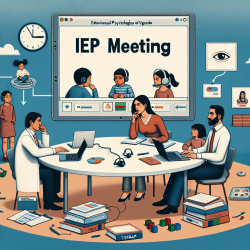Individualized Education Program (IEP) planning and meetings can often feel like a monumental task, especially for educational psychologists who are already balancing numerous responsibilities. The feeling of burnout is all too common in our field, but there are strategies to make this process more manageable and effective. In this blog, we’ll explore actionable tips to transform your IEP meetings, helping you feel more inspired and less overwhelmed.
Preparation is Key
One of the most significant factors in successful IEP meetings is thorough preparation. Here are some steps to ensure you are well-prepared:
- Review Previous IEPs: Take time to review past IEPs and progress reports to understand the child's history and current needs.
- Gather Comprehensive Data: Collect data from teachers, parents, and other relevant parties to have a holistic view of the child's performance and needs.
- Schedule Pre-Meetings: If possible, hold brief pre-meetings with key team members to align on goals and expectations.
Effective Communication
Clear and effective communication is vital during IEP meetings. Consider these tips:
- Active Listening: Make sure to actively listen to all participants, especially parents, to ensure their concerns and insights are addressed.
- Use Simple Language: Avoid jargon and use language that is easily understood by all attendees, including parents and children if they are present.
- Visual Aids: Utilize visual aids such as charts and graphs to illustrate points clearly.
Leveraging Technology
Technology can be a game-changer in IEP planning and meetings. Online therapy services like TinyEYE offer numerous advantages:
- Accessibility: Online platforms make it easier to include all necessary participants, even if they are geographically dispersed.
- Resource Sharing: Digital tools allow for easy sharing of documents and resources, making the meeting more efficient.
- Flexibility: Online meetings can be scheduled at convenient times, reducing the stress of finding a suitable time for everyone.
Focus on Strengths
IEP meetings often focus on areas of improvement, but it’s equally important to highlight the child’s strengths. This positive approach can be incredibly motivating:
- Strength-Based Goals: Develop goals that build on the child's strengths, fostering a sense of achievement and confidence.
- Celebrate Successes: Take time to celebrate the child’s successes, no matter how small. This can boost morale for both the child and the team.
Self-Care for Educational Psychologists
Finally, remember to take care of yourself. Burnout is real, and it’s essential to practice self-care:
- Set Boundaries: Establish clear boundaries between work and personal life to avoid overextending yourself.
- Seek Support: Don’t hesitate to seek support from colleagues or professional networks. Sharing experiences and strategies can be incredibly beneficial.
- Mindfulness Practices: Incorporate mindfulness practices such as meditation or deep breathing exercises into your routine to manage stress.
By implementing these strategies, you can transform your IEP meetings into more efficient, positive, and inspiring experiences. Remember, the ultimate goal is to support the children and help them achieve their full potential. With the right approach, you can make a significant impact without feeling burnt out.










